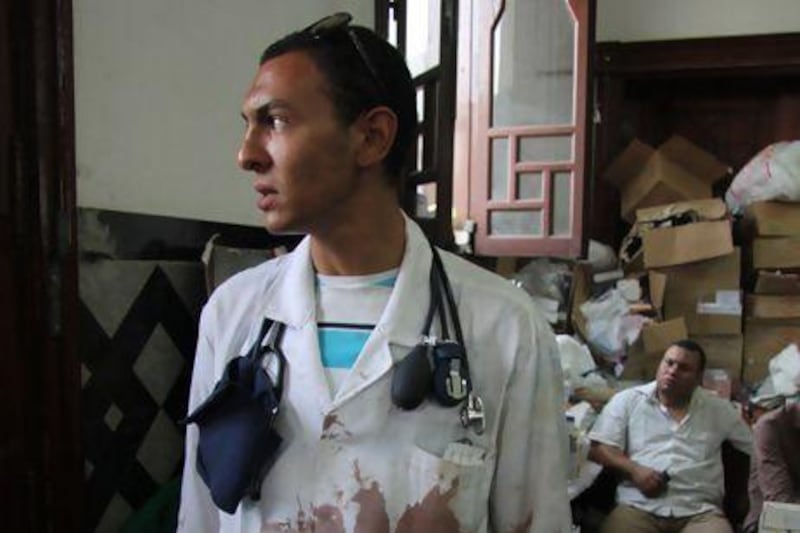CAIRO// The walking wounded have dazed looks on their faces and blood on their shirts. Clutching X-rays, criss-crossed with bandages, they beseech journalists to take pictures of skin spattered with birdshot, of fresh plaster casts over bones shattered by bullets.
A man shouts himself hoarse with calls for God to avenge the dozens of dead. People prop up signs calling for the blood to be a curse on those who spilt it. Men's shoulders shake as they weep while praying.
Here, inside the camp of Mohammed Morsi's supporters - which has occupied a square outside the Rabaa Adaweya mosque for more than a week - the deaths of dozens of people yesterday morning have horrified and galvanised the demonstrators.
Military and security spokesmen insisted that the nearby Republican Guard headquarters, where groups of people have demonstrated and camped out for days, was attacked by armed men at dawn, forcing them to retaliate.
But eyewitnesses, many of whom say that until that moment they trusted the rank-and-file of the army, say that they were attacked while they prayed barefoot with their backs to the soldiers.
Ali Al Hadidi Hafez, a demonstrator, said that it was halfway through the prayer, as they bowed down for the second time, that the trouble began.
Rows of people were praying outside the headquarters on Salah Salem Street, he said. In the dim dawn light police forces and special operations soldiers approached them from out of a tunnel under the road on one side and marching along the road on the other side.
Initially, police forces fired tear gas and birdshot into the crowd, said Mohamed Sayed Mohamed, a 20-year-old student, showing the marks where doctors dug pellets out of the side of his head earlier that day. Then, about half an hour later, in the confusion, soldiers began firing live rounds.
"I saw one guy go up to an officer in the time of the shooting and say, 'We are brothers', and another who came with a Quran," he said. "They shot them both."
Along with about a dozen other witnesses from among Mr Morsi's supporters, he insisted that none of the demonstrators carried weapons, although some threw stones at the security forces.
The shooting lasted about three hours, he said, after beginning at about half-past three in the morning. "There were people who ran to the square [outside the Rabaa Adaweya mosque] and there were people who stayed still and there were people helping to carry away the injured," he said.
Hundreds of injured people were treated at several local hospitals, but most of them passed initially through a field hospital set up next to the mosque, where volunteer doctors have been working since demonstrations turned violent more than a week ago.
Mohamed Shehab, 25, a medical student who has been volunteering in field hospitals since the uprising two and a half years ago that felled president Hosni Mubarak, said that he had personally seen 15 bodies.
"I carried them," he said, gesturing towards his stained white coat. "This is their blood."
Several people alleged that there were gunmen on the roofs of surrounding buildings, shooting at the demonstrators below. Mr Shehab said that he saw three cases of gunshot wounds where the bullet's trajectory indicated that it had come from above. Most of the deaths, he said, came from gunshot wounds to the head, or blood loss.
Women and children, including a baby, were among the dead, said doctors. The manager of the field hospital told a press conference, said that four children were among the dead, from six months to 11 years old, and that eight women had died in the violence.
"When I saw this, I was angry to the absolute maximum ... this is abnormal treatment from the army," Mr Shehab said. "It is too tough. This is the way to the edge of the mountain."
Around him, doctors slept on the floor, relatives waited for news of their loved ones, and people arrived with fresh supplies of iodine and scalpels, as some of the injured were treated outside because of lack of space.
"On such a dark day, a red day, a black day, people wake up to something that never happened in Egyptian history," said Gamal Abdel-Salam of the doctors' syndicate in a press conference in the field hospital. "We have martyrs with the bullets of the Egyptian army."
Amid the grief for those dead and the rush to treat the injured, many expressed a profound resolve to stand firm - and unarmed - in the face of what they saw as an unprecedented injustice.
"We are here. We are not leaving until Mr Morsi comes back," said Mr Hafez, the demonstrator. "We insist on peaceful protests. There are many who are trying to drag us into using force, but we know we are going to lose if we do."
twitter: For breaking news from the Gulf, the Middle East and around the globe follow The National World. Follow us





